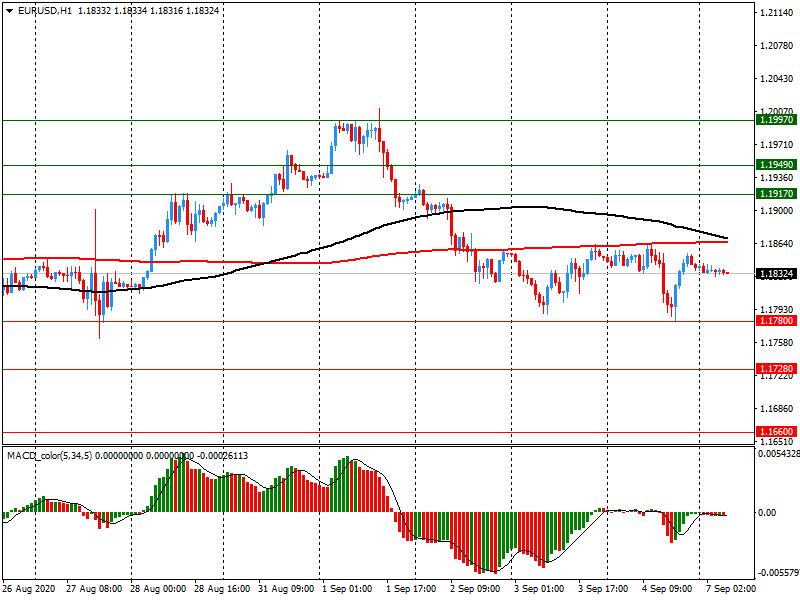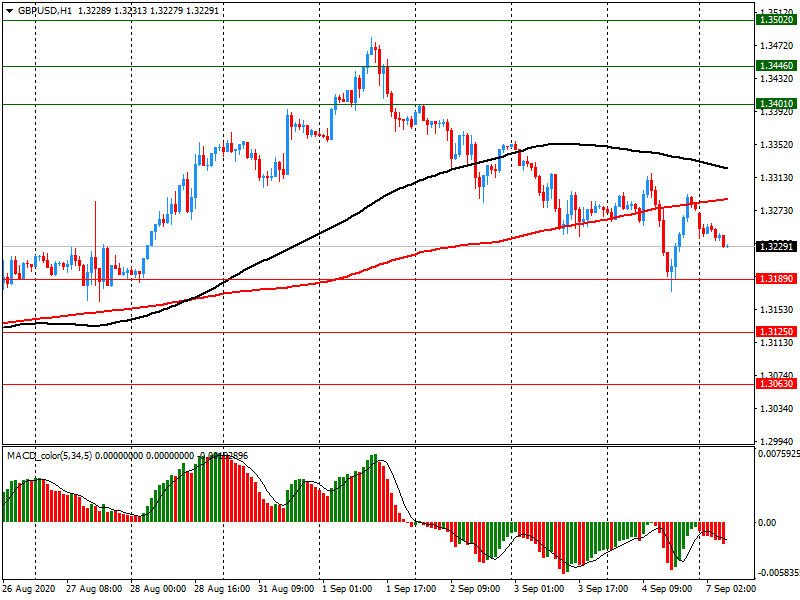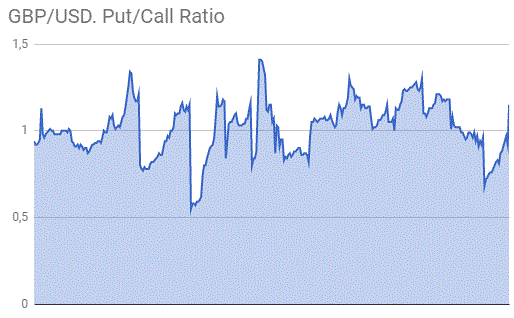- Analytics
- News and Tools
- Market News
CFD Markets News and Forecasts — 07-09-2020
| Time | Country | Event | Period | Previous value | Forecast |
|---|---|---|---|---|---|
| 01:30 | Australia | National Australia Bank's Business Confidence | August | -14 | |
| 05:00 | Japan | Eco Watchers Survey: Current | August | 41.1 | |
| 05:00 | Japan | Eco Watchers Survey: Outlook | August | 36 | |
| 05:30 | France | Non-Farm Payrolls | Quarter II | -2.0% | |
| 06:00 | Germany | Current Account | July | 22.4 | |
| 06:00 | Germany | Trade Balance (non s.a.), bln | July | 15.6 | |
| 06:45 | France | Trade Balance, bln | July | -8 | |
| 09:00 | Eurozone | Employment Change | Quarter II | -0.2% | |
| 09:00 | Eurozone | GDP (QoQ) | Quarter II | -3.6% | -12.1% |
| 09:00 | Eurozone | GDP (YoY) | Quarter II | -3.1% | -15% |
| 19:00 | U.S. | Consumer Credit | July | 8.95 | 13.75 |
FXStreet reports that last week produced declines in oil. Floating storage levels remain quite elevated and many of those barrels will be delivered into Asia in the 4th quarter adding to near-term oversupply concerns. Furthermore, Iraq is reportedly seeking a two-month extension to make up for the additional OPEC+ supply cuts it agreed to weeks ago, a rather telling development, per Rabobank.
“We continue to see oversupply risks developing in Asia in the 4th quarter as floating storage trades are unwound and crude is delivered onshore. The timing of this large wave of crude deliveries into Asia also coincides with the timing for a potential second wave of outbreaks which if it were to occur would be very detrimental to global crude oil demand.”
“We continue to focus on macro factors influencing oil prices as they remain crucial drivers. Further to that point, the sharp decline in equities this week and strength in the US dollar is notable and the potential for further corrections in risk assets is certainly feasible.”
According to the report from Sentix, the economic recovery, which has been observable globally since May 2020, continues in September. In Euroland, but also in many other regions, we are measuring the fifth consecutive rise in the overall indices. A positive aspect is that the expectation values remain stable, i.e. the improvement is largely driven by the current situation.
The dynamic catch-up process of the Euroland economy continues in September. For the fifth time in a row, the overall index improved to its current level of -8 points. After all, this is the best value since February 2020! On the positive side, this improvement is supported by stable expectation values. These have been around +20 points since June. In other words: the overall index is improving mainly due to a better assessment of the current situation. This is also urgently needed, as the situation rushed in March to levels that were even lower than those at the height of the financial crisis. But the way out of the recession remains a long way off, as the current value of -33 for the situation assessment shows.
Overall, the current recovery phase is similar to that of 2009, when we also saw a continuous improvement, which, as today, had little impact on stock market expectations. In 2010, investors were positively surprised by the economy. At present, investors doubt that there will be a repeat. Investors still believe that only about 75% of the economic slump will be made up within a year as a result of the lockdown in March. A second lockdown or similar is not even factored into the price.
CNBC reports that China is in for “a tough time” in the short term as the U.S. tries to deny it access to crucial tech components, a business consultant told on Monday.
Tensions between the two countries in the technology space heated up over the weekend with the U.S. considering blacklisting China’s largest chipmaker, Semiconductor Manufacturing International Corporation or SMIC.
The measure would restrict SMIC from obtaining specific goods made in the U.S. Even though China has been developing its own semiconductor manufacturing capabilities, companies such as SMIC still relies on American equipment in its production line.
Richard Martin, managing director of IMA Asia, told CNBC’s “Squawk Box Asia” that China may have to “look elsewhere” for supply of semiconductors if SMIC’s ability to produce them is crippled by the U.S. move.
“The problem with looking elsewhere is if you go to Europe or if you go to Japan, the companies in Europe and Japan are using U.S. machinery at some point in their production process. And therefore ... they can be hit by this U.S. effort to choke it off,” he said.
“So what China needs to do is move the entire supply chain into China,” he added.
Such effort may take years given that SMIC is still “a long way” behind its rivals in terms of chip-making capabilities, said Martin.
FXStreet reports that Karen Jones, Team Head FICC Technical Analysis Research at Commerzbank, is focused on the four-month EUR/USD uptrend at 1.1732 as a lost of this level will introduce scope for a slide towards the 55-day ma at 1.1620.
“EUR/USD sold off last week and starts this week with the focus on the four-month uptrend at 1.1732. Intraday Elliott wave counts are negative and there is a risk that the up trend will give way. Failure here will target the 55-day ma at 1.1620 and potentially the March high at 1.1495.”
“The market has recently failed at 1.2014 and intraday rallies are indicated to hold below 1.1875.”
According to the report from Halifax Bank of Scotland, on a monthly basis, UK house prices in August were 1.6% higher than in July. In the latest quarter (June to August) house prices were 1.3% higher than in the preceding three months (March to May)
House prices in August were 5.2% higher than in the same month a year earlier. Uncertainty remains with likely greater downward pressure on prices in the medium term
Russell Galley, Managing Director, Halifax, said: “House prices continued to beat expectations in August, with prices again rising sharply, up by 1.6% on a monthly basis. Annual growth now stands at 5.2%, its strongest level since late 2016, with the average price of a property tipping over £245,000 for the first time on record. A surge in market activity has driven up house prices through the post-lockdown summer period, fuelled by the release of pent-up demand, a strong desire amongst some buyers to move to bigger properties, and of course the temporary cut to stamp duty. Notwithstanding the various positive factors supporting the market in the short-term, it remains highly unlikely that this level of price inflation will be sustained. The macroeconomic picture in the UK should become clearer over the next few months as various Government support measures come to an end, and the true scale of the impact of the pandemic on the labour market becomes apparent".
Reuters reports that the European Union’s chief Brexit negotiator Michel Barnier said on Monday that Britain wanted “the best of two worlds” in the divorce deal, adding that negotiations were difficult.
“I remain worried ... the negotiations are difficult, because the British want the best of both worlds,” Barnier told on France Inter radio.
He added that he believed it was possible to find a deal on fisheries.
| Time | Country | Event | Period | Previous value | Forecast | Actual |
|---|---|---|---|---|---|---|
| 01:30 | Australia | ANZ Job Advertisements (MoM) | August | 19.1% | 1.6% | |
| 03:00 | China | Trade Balance, bln | August | 62.33 | 50.5 | 58.93 |
| 05:00 | Japan | Leading Economic Index | July | 83.8 | 86.9 | |
| 05:00 | Japan | Coincident Index | July | 74.4 | 76.2 | |
| 06:00 | Germany | Industrial Production s.a. (MoM) | July | 9.3% | 4.7% | 1.2% |
| 07:00 | Switzerland | Foreign Currency Reserves | August | 845.797 | 848.3 |
During today's Asian session, the US dollar rose slightly against the euro and the yen.
The focus of traders ' attention this week is directed to the next meeting of the European Central Bank (ECB), which will be held on Thursday. Last week, the euro against the dollar rose above the $1.2 mark for the first time since may 2018, after which it quickly moved to a fall on signals of concern about the ECB's significant strengthening of the european currency recently. ECB leaders fear, in particular, that the strengthening of the euro may further weaken inflation and increase the need to increase monetary stimulus. On Friday, the euro fell against the dollar for the fourth consecutive session.
Since March, the ECB has launched stimulus programs totaling about $3 trillion to support the economy in crisis due to the COVID-19 pandemic.
Danske Bank experts believe that the recent strengthening of the euro is temporary and should not affect inflation expectations in the euro area.
"Although we have raised the short - term forecast for the EUR/USD, we expect the european currency to weaken on the 12-month horizon, as structural and institutional weakness in the euro area will play a role," Danske Bank said.
The ICE index, which tracks the dynamics of the US dollar against six currencies (euro, swiss franc, yen, canadian dollar, pound sterling and swedish krona), rose 0.25%.
Reuters reports that the global economy is likely not headed for any major slowdown due to COVID-19 but piled-up storage and uncertainty over China's oil demand cloud oil markets' recovery, an official with International Energy Agency (IEA) said.
Keisuke Sadamori, IEA director for energy markets and security, told Reuters the outlook for oil was in the midst of either a second wave or a steady first wave of the coronavirus.
"Even though (the market is) not expecting real robust growth coming back soon, the view on demand is more stable compared with three months ago," he said in an interview.
The IEA cut its 2020 oil demand forecast in its monthly report on Aug. 13, warning that reduced air travel would lower global oil demand by 8.1 million barrels per day (bpd).
The Paris-based agency downgraded its outlook for the first time in three months, as the epidemic continues to wreak economic pain and job losses worldwide.
"It doesn't seem like a massive stock draw seems to be happening yet," Sadamori said.
"We are not seeing a robust pickup in refining activity, and jet fuel is the big problem," he added.
China, the world's largest crude importer, emerged from an economic lockdown sooner than other major economies and used its financial muscle to make record oil imports in recent months, a rare bright spot amid global demand destruction.
But geopolitical tensions could call into doubt "to what extent it can be sustainable and last long", Sadamori said.
According to provisional data of the Federal Statistical Office (Destatis), in July 2020, production in industry was up by 1.2% on the previous month on a price, seasonally and calendar adjusted basis. Economists had expected a 4.7% increase. Compared with July 2019, the decrease in calendar adjusted production in industry amounted to 10.0%.
In July 2020, production in industry excluding energy and construction was up by 2.8%. Within industry, the production of intermediate goods showed an increase by 4.0%. The production of consumer goods increased by 1.8% and the production of capital goods by 2.1%. Outside industry, energy production was down by 0.6% in July 2020 and the production in construction decreased by 4.3%.
Production in the automotive industry in July rose slightly by 6.9% month on month. However, it was still by just over 15% lower than in February 2020.
In June 2020, the corrected figure shows the production in industry an increase of 9.3% (primary +8.9%) from May 2020.
EUR/USD
Resistance levels (open interest**, contracts)
$1.1997 (3848)
$1.1949 (625)
$1.1917 (345)
Price at time of writing this review: $1.1832
Support levels (open interest**, contracts):
$1.1780 (902)
$1.1728 (2850)
$1.1660 (4415)
Comments:
- Overall open interest on the CALL options and PUT options with the expiration date September, 4 is 56688 contracts (according to data from September, 4) with the maximum number of contracts with strike price $1,1700 (4415);
GBP/USD
Resistance levels (open interest**, contracts)
$1.3502 (762)
$1.3446 (220)
$1.3401 (156)
Price at time of writing this review: $1.3229
Support levels (open interest**, contracts):
$1.3189 (150)
$1.3125 (397)
$1.3063 (2621)
Comments:
- Overall open interest on the CALL options with the expiration date September, 4 is 9387 contracts, with the maximum number of contracts with strike price $1,3500 (1164);
- Overall open interest on the PUT options with the expiration date September, 4 is 10812 contracts, with the maximum number of contracts with strike price $1,3000 (2621);
- The ratio of PUT/CALL was 1.15 versus 0.95 from the previous trading day according to data from September, 4
* - The Chicago Mercantile Exchange bulletin (CME) is used for the calculation.
** - Open interest takes into account the total number of option contracts that are open at the moment.
| Raw materials | Closed | Change, % |
|---|---|---|
| Brent | 42.05 | -3.4 |
| Silver | 26.84 | 1.09 |
| Gold | 1932.818 | 0.11 |
| Palladium | 2297.19 | 0.18 |
| Index | Change, points | Closed | Change, % |
|---|---|---|---|
| NIKKEI 225 | -260.1 | 23205.43 | -1.11 |
| Hang Seng | -312.15 | 24695.45 | -1.25 |
| KOSPI | -27.65 | 2368.25 | -1.15 |
| ASX 200 | -187.1 | 5925.5 | -3.06 |
| FTSE 100 | -51.78 | 5799.08 | -0.88 |
| DAX | -215.11 | 12842.66 | -1.65 |
| CAC 40 | -44.45 | 4965.07 | -0.89 |
| Dow Jones | -159.42 | 28133.31 | -0.56 |
| S&P 500 | -28.1 | 3426.96 | -0.81 |
| NASDAQ Composite | -144.96 | 11313.13 | -1.27 |
| Time | Country | Event | Period | Previous value | Forecast |
|---|---|---|---|---|---|
| 01:30 | Australia | ANZ Job Advertisements (MoM) | August | 16.7% | |
| 03:00 | China | Trade Balance, bln | August | 62.33 | 50.5 |
| 05:00 | Japan | Leading Economic Index | July | 84.4 | |
| 05:00 | Japan | Coincident Index | July | 76.6 | |
| 06:00 | Germany | Industrial Production s.a. (MoM) | July | 8.9% | 4.7% |
| 07:00 | Switzerland | Foreign Currency Reserves | August | 845.797 | |
| 07:30 | United Kingdom | Halifax house price index 3m Y/Y | August | 3.8% | |
| 07:30 | United Kingdom | Halifax house price index | August | 1.6% | |
| 08:30 | Eurozone | Sentix Investor Confidence | September | -13.4 | |
| 23:30 | Japan | Labor Cash Earnings, YoY | July | -1.7% | |
| 23:30 | Japan | Household spending Y/Y | July | -1.2% | -3.7% |
| 23:50 | Japan | Current Account, bln | July | 167.5 | 1868.6 |
| 23:50 | Japan | GDP, q/q | Quarter II | -0.6% | -8.1% |
| 23:50 | Japan | GDP, y/y | Quarter II | -2.2% | -28.6% |
| Pare | Closed | Change, % |
|---|---|---|
| AUDUSD | 0.72838 | 0.18 |
| EURJPY | 125.766 | -0.03 |
| EURUSD | 1.18386 | -0.09 |
| GBPJPY | 141.033 | 0.1 |
| GBPUSD | 1.32755 | 0.01 |
| NZDUSD | 0.67182 | 0.19 |
| USDCAD | 1.3057 | -0.5 |
| USDCHF | 0.91321 | 0.5 |
| USDJPY | 106.226 | 0.08 |
© 2000-2026. All rights reserved.
This site is managed by Teletrade D.J. LLC 2351 LLC 2022 (Euro House, Richmond Hill Road, Kingstown, VC0100, St. Vincent and the Grenadines).
The information on this website is for informational purposes only and does not constitute any investment advice.
The company does not serve or provide services to customers who are residents of the US, Canada, Iran, The Democratic People's Republic of Korea, Yemen and FATF blacklisted countries.
Making transactions on financial markets with marginal financial instruments opens up wide possibilities and allows investors who are willing to take risks to earn high profits, carrying a potentially high risk of losses at the same time. Therefore you should responsibly approach the issue of choosing the appropriate investment strategy, taking the available resources into account, before starting trading.
Use of the information: full or partial use of materials from this website must always be referenced to TeleTrade as the source of information. Use of the materials on the Internet must be accompanied by a hyperlink to teletrade.org. Automatic import of materials and information from this website is prohibited.
Please contact our PR department if you have any questions or need assistance at pr@teletrade.global.


















